Key takeaways:
- Tax credits provide significant financial relief by reducing tax bills, with various types available for specific situations, such as the Child Tax Credit and Earned Income Tax Credit (EITC).
- Understanding eligibility criteria, including income level and dependent status, is crucial for maximizing tax benefits and avoiding missed credits.
- Staying organized, up-to-date on tax law changes, and seeking assistance from resources like community organizations can significantly enhance tax credit claims and ensure no potential savings are overlooked.
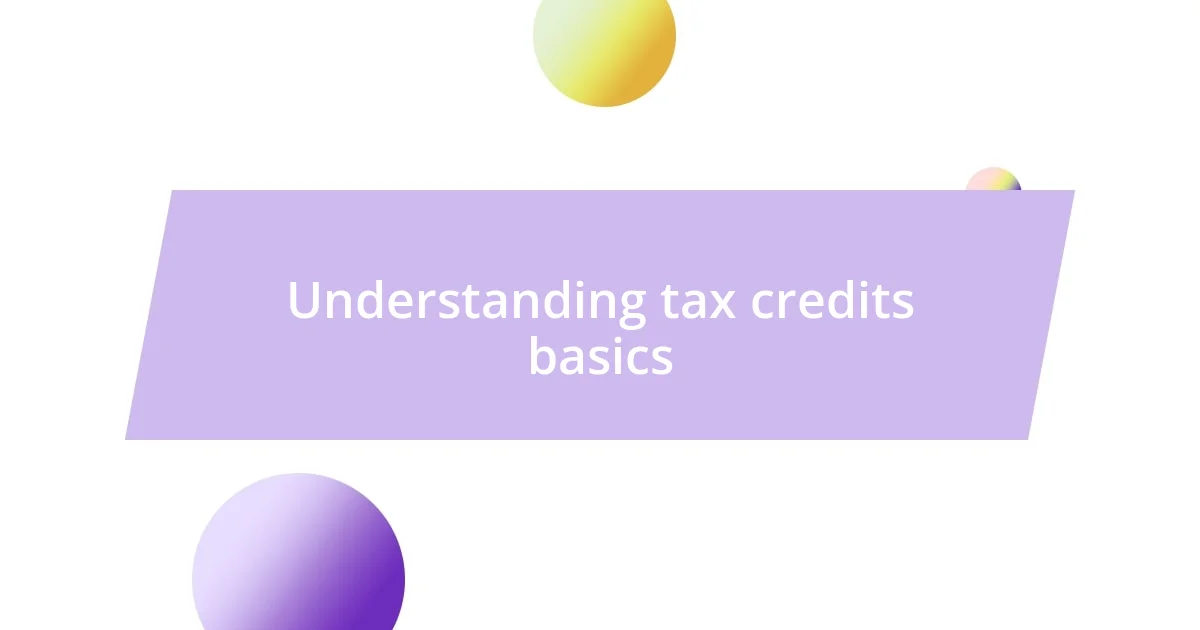
Understanding tax credits basics
Tax credits can feel overwhelming at first. I remember when I was navigating through my own tax situation; it seemed like a labyrinth of information. But at the heart of it, a tax credit is simply a dollar-for-dollar reduction in your tax bill, which can significantly lighten your financial load—especially in times when every penny counts.
There are various types of tax credits available, such as those for education expenses or childcare. I once qualified for the Child Tax Credit, and honestly, I felt a wave of relief when I realized it would directly reduce my taxes to the point where I could redirect that money toward savings. Have you ever experienced a financial break like that? It’s incredible how such credits can impact your day-to-day living.
Understanding whether a tax credit is refundable or nonrefundable is essential. Refundable credits can give you a tax refund even if your tax liability is zero, which is something I didn’t fully grasp until I sat down with a tax advisor. I’ll never forget the excitement of discovering I had a refundable credit that not only offset my taxes but also put a little extra cash back in my pocket. This knowledge is empowering, transforming the way I view my finances and tax filings overall.
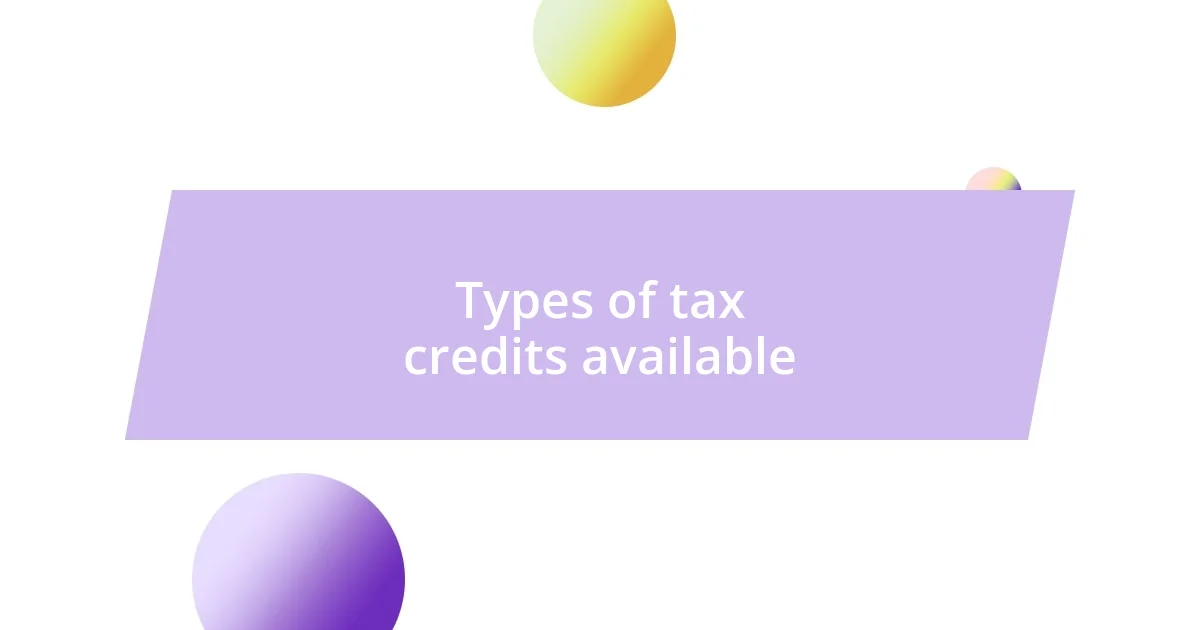
Types of tax credits available
Tax credits come in various forms, each tailored to help people in specific situations. For instance, I vividly recall how invaluable the Earned Income Tax Credit (EITC) was during a particularly tough financial year when my income fluctuated. It felt like a lifeline, providing me with a substantial refund that made all the difference in covering unexpected expenses.
Here are some common types of tax credits available:
- Child Tax Credit: Provides additional funds for families with dependent children, helping ease the financial burden of raising kids.
- Earned Income Tax Credit (EITC): Aimed at low to moderate-income earners, it rewards work and can lead to a significant tax refund.
- American Opportunity Tax Credit: Specifically for education, it allows students to claim credits for qualified tuition and related expenses in their first four years of higher education.
- Lifetime Learning Credit: This credit assists those pursuing further education beyond the traditional undergraduate degree, covering a portion of tuition and course-related expenses.
- Child and Dependent Care Credit: Tailored for parents or guardians who incur childcare expenses, offering relief for those balancing work and family responsibilities.
Each tax credit can transform your financial landscape in unexpected ways, and I still remember the sense of security I felt when I realized I could take advantage of these options. It’s like finding hidden treasure in a field of paperwork!
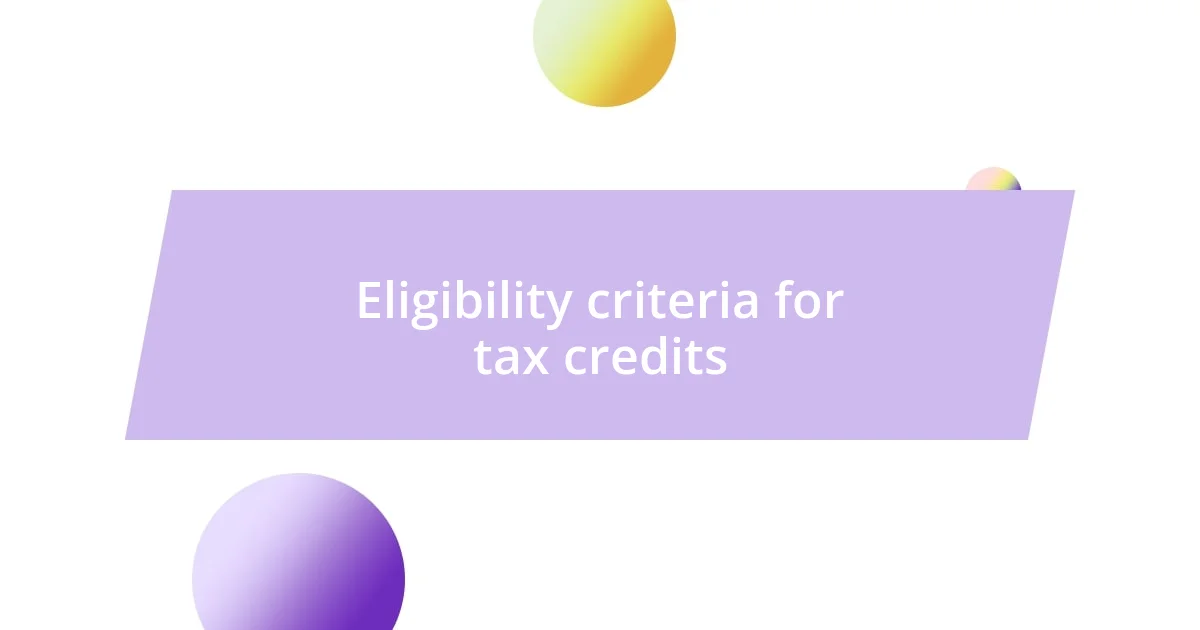
Eligibility criteria for tax credits
Understanding the eligibility criteria for tax credits is crucial. I learned firsthand how my income level determined my access to various credits. You see, many tax credits are designed for low- to moderate-income earners; discovering that I qualified for the EITC was a game-changer for me, and it felt like a validation of my hard work.
In addition to income thresholds, being aware of other eligibility requirements can make all the difference. For example, I remember feeling so relieved when I verified that my children were indeed dependents, which qualified me for the Child Tax Credit. Have you ever overlooked a small detail in your tax return that could make a large impact? It’s moments like these that remind us to double-check our entries.
Ultimately, understanding the specifics of eligibility, like filing status and age requirements for certain credits, can unlock savings. I can share that it was eye-opening to learn that different credits don’t always apply equally to everyone. Each tax filing season has taught me that being proactive in understanding these criteria can lead to unexpectedly beneficial results.
| Eligibility Criteria | Details |
|---|---|
| Income Level | Determines qualification; varies by type of credit. |
| Filing Status | Must match requirements (single, married, etc.). |
| Dependent Status | Dependents can enhance credit eligibility. |
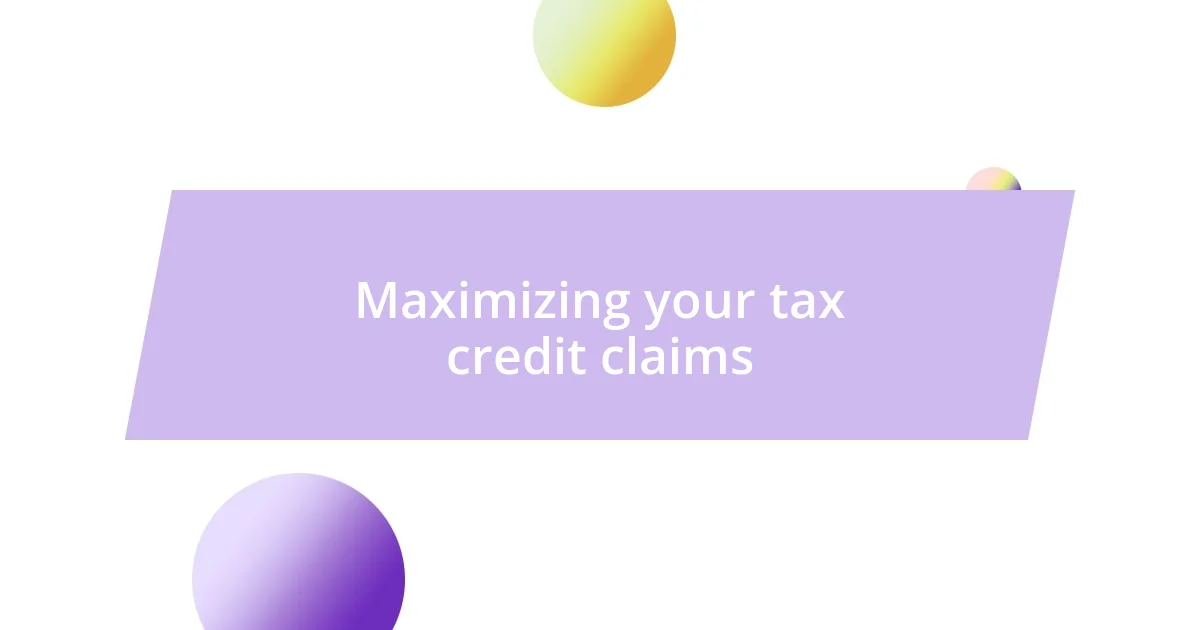
Maximizing your tax credit claims
I’ve found that keeping organized records really helps when it comes to maximizing tax credit claims. Think about all those receipts and forms piling up throughout the year—it’s easy to feel overwhelmed. However, I started using a simple spreadsheet to track eligible expenses. This not only made my life easier come tax season, but it also ensured I didn’t miss out on any credits I could claim. Have you ever had that sinking feeling of forgetting something crucial? Trust me, staying organized pays off.
Another key strategy is to stay informed about tax law changes each year. I vividly remember the time I almost didn’t claim the recent updates that impacted the Child Tax Credit. A colleague mentioned it casually in a conversation, and it sparked my curiosity. That little nudge led me to research and ultimately boosted my refund significantly. I can’t help but wonder—how many tax credits might go unclaimed simply because we’re not aware of the latest changes? Staying updated can be the difference between a modest refund and a substantial one.
Lastly, I always recommend consulting a tax professional, especially if your situation feels complex. I recall a particularly challenging year when my freelance income fluctuated widely. Relying on a tax expert not only saved me time, but their insights into available tax credits were invaluable. It was like having a lighthouse guiding me through a foggy night. Have you ever considered how much a fresh perspective could change your financial strategy? Finding the right advice can truly illuminate your path to claiming every possible benefit!
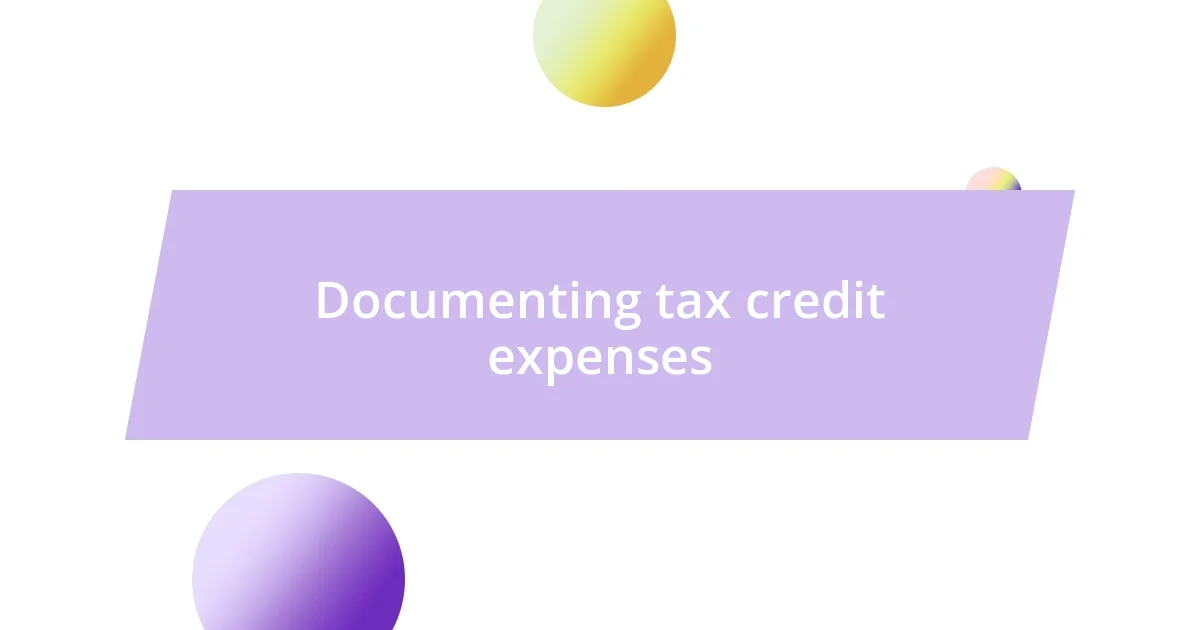
Documenting tax credit expenses
Documenting tax credit expenses is essential for ensuring you don’t leave any money on the table. I remember the first time I faced a stack of receipts from donations, childcare expenses, and medical bills, and it felt daunting. I soon realized that a simple filing system—like designated folders for each type of expense—did wonders for clarity. Have you tried something similar? I can’t stress enough how beneficial it is to have everything organized when tax season rolls around.
One tactic that proved invaluable for me was taking photos of receipts as I collected them. It might sound basic, but I used an app to scan and store them digitally. This process not only saved space, but it also allowed me to quickly reference documentation without sifting through a pile of paper. Have you ever lost a crucial receipt needed for your deductions? Storing digital copies means you can breathe a sigh of relief, knowing you have the information at your fingertips.
Additionally, I learned the importance of maintaining a tax journal. Each month, I’d jot down eligible expenses and any tax-related conversations I’d had. This clear documentation served as a reminder as I prepared my return. Have you ever wished you’d written something down earlier? Trust me, those small notes can trigger important memories and contribute to maximizing your claims effectively. Keeping a detailed record transformed my approach to tax credits and brought a level of confidence I had never felt before.

Common mistakes to avoid
It’s so easy to overlook tax credits entirely when you’re buried in paperwork. I remember one year feeling overconfident, thinking I had everything down, only to realize I hadn’t double-checked my eligibility for the Earned Income Tax Credit. That nagging thought stayed with me for weeks, reminding me how crucial it is to really review all potential credits before filing. Have you ever had a moment where a small oversight caused you regret? It’s a sinking feeling I try to avoid now.
Another mistake I often see is failing to keep up with changes specific to your life situation that impact credits. For instance, when I got married, I didn’t fully grasp how that adjustment could benefit my tax credits. Missing out on the benefits of filing jointly put a dent in my refund that year. Have you ever felt like your financial choices were made in a fog? Trust me, staying aware of how life changes affect your tax situation can ensure you’re maximizing the credits available to you.
Also, be wary of rushing through the forms. I learned this the hard way after hastily submitting my tax return one year, only to discover I hadn’t included my student loan interest deduction. It was frustrating, especially since that tax credit could have helped lighten my financial load! Have you experienced that annoying realization of a rush job gone wrong? Taking the time to thoughtfully complete each section can mean the difference between a frustrating tax season and substantial savings.
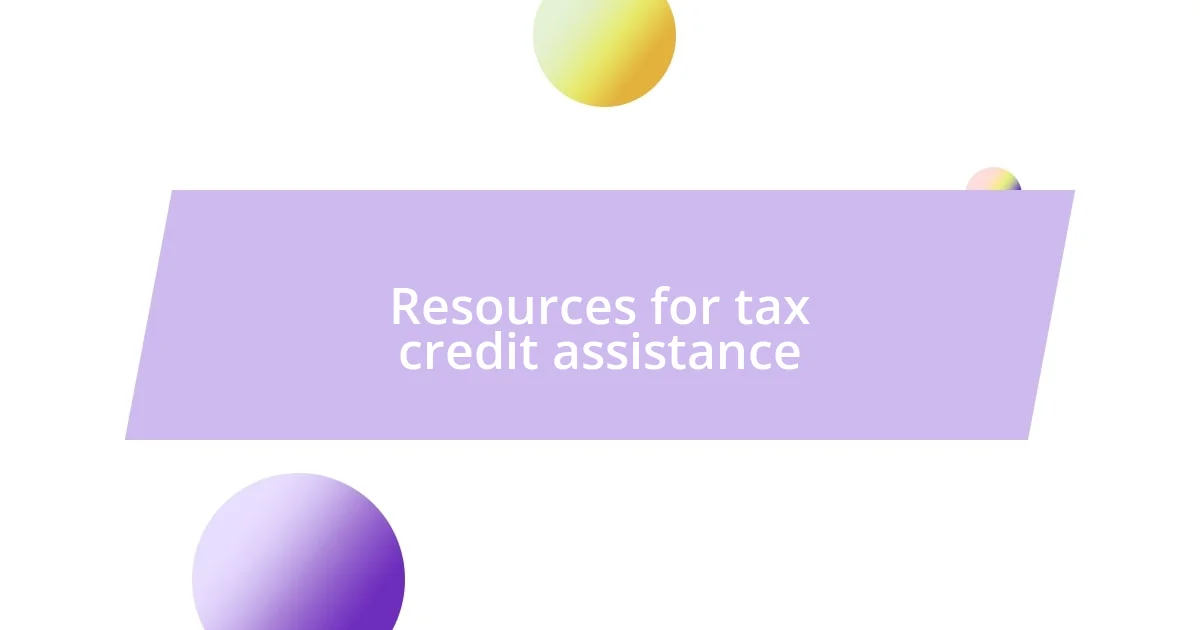
Resources for tax credit assistance
I’ve found some truly helpful resources for tax credit assistance that I wish I had known about earlier. One of my go-to places is the IRS website, where you can find detailed guides about various credits. The tool for determining your eligibility is a game-changer! It’s like having a knowledgeable friend walking you through the process. Have you ever felt lost trying to navigate tax credits? This site can provide clarity right when you need it most.
Local community organizations can be a treasure trove of support. I recall discovering a local nonprofit that offered free tax preparation services. Not only did they help me understand which credits I qualified for, but they also provided insights that I wouldn’t have considered on my own. Have you checked what’s available in your area? Sometimes resources sit right under our noses, waiting to be uncovered, and they’re often staffed by friendly folks eager to help.
Additionally, don’t underestimate the power of online forums and social media groups. I joined a Facebook group focused on taxes and tax credits, and it quickly became a supportive space for sharing tips and experiences. I’ve learned so much from others sharing their victories and mishaps. Are you part of a community that could offer you insight? Engaging with others can turn the often-isolating process of tax preparation into a collective journey, making it feel less overwhelming and more manageable.














